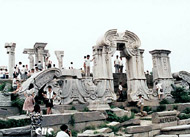|
|
The Ruins of the Yuanmingyuan (The Garden of Perfection and Light)
|
|
| |
 In a quiet section of the suburbs of Beijing to the northwest of Qinghua University, there once stood a complex of gardens known as the Yuanmingyuan. Built in the Qing Dynasty, this "garden of gardens" was made up of the Garden of Perfection and Light (Yuanmingyuan), and the Garden of Ten Thousand Springtimes (Wanchunyuan).
In a quiet section of the suburbs of Beijing to the northwest of Qinghua University, there once stood a complex of gardens known as the Yuanmingyuan. Built in the Qing Dynasty, this "garden of gardens" was made up of the Garden of Perfection and Light (Yuanmingyuan), and the Garden of Ten Thousand Springtimes (Wanchunyuan).
The work of building the garden went on over a period of 150 years, beginning in around 1700. The grounds had a circumference of 10 kilometers and occupied an area of more than 347 hectares. Of the hundreds of large and small buildings, which once stood here, all that remains are a few ruins in stone, a sorry reminder of past greatness.
On October 5, 1860, the Anglo-French Allied Armies occupied the town of Haidian in the northwest suburbs of the capital, and on October 7 the mad plunder of the garden began. Finally, Lord Elgin's cavalry set the gardens on fire, leaving them to burn for three days and three nights. After their retreat, repairs were begun, but in 1900 the Eight-Power Allied Forces, leaving it in completer ruin, brought further destruction upon the garden. Before long, members of the imperial household and the warlords of the early Republican period took whatever could be made use of from out of the rubble, including wood, stones, bricks or tiles, away.
Visitors can now stroll about the ruins and view the remains of the following sites: ⑴ the "Vista of the Square Teapot" on the northeast bank of the Sea of Fortune (Fuhai); ⑵ the Green Mountain Hut near the northwestern gate; ⑶ the Jade Islet of Sages in the middle of the Sea of Fortune; ⑷ the Magnanimity of the Seas and Hills in the West Lake of the Garden of Eternal Spring; ⑸ Sravasti City, modeled after the capital of the ancient Indian state of Kosala, which was a repository for statues of the Buddha. The ruins of the high walls of this "city" can still be traced today; and ⑹ the Source of Culture Pavilion (Wenyuange), which housed the collection of books known as the Complete Library in the Four Branches of Literature. Besides the remains of the pavilion, one will also notice numerous specimens of Taihu Lake stone lying abandoned in a pool in its courtyard. In addition, other scattered stone fragments and the flagstones from stone paths can be found in various spots throughout the surrounding hills and meandering streams.
The most striking ruin in the whole garden is the complex of Western-style buildings, the construction of which began in 1746, the 10th year of Emperor Qianlong' s reign. Situated near the northern wall of the Garden of Eternal Spring, these buildings were designed by the Jesuits Castiglione and Benoit. They included the Observatory and Hall of Tranquility, which were decorated with fine fountains and pools in the style of Versailles. In addition, their roofs and walls were embellished with glazed tiles in brilliant colors.
It is hoped that before long the splendor of the garden will be restored and that this exquisite cultural relic, once the private playground of emperors, will be open to visitors from all over the world.
In 1977, the Beijing municipality established a committee to undertake the renovation of the Yuanmingyuan Garden, the first organization of its kind to be set up since the destruction of the garden. Some of the stone carvings removed from the garden are now being returned from places such as Beijing University.
Address: Yuanmingyuan Lu, Haidian District, north of Peking University;
Entry ticket: 35 yuan;
Traffic: Bus No.s 331, 365, 375 (ext), 717, 801, 810, and 973;
Tel:
86-10-62628501.
(China.org.cn)
|
|
|












